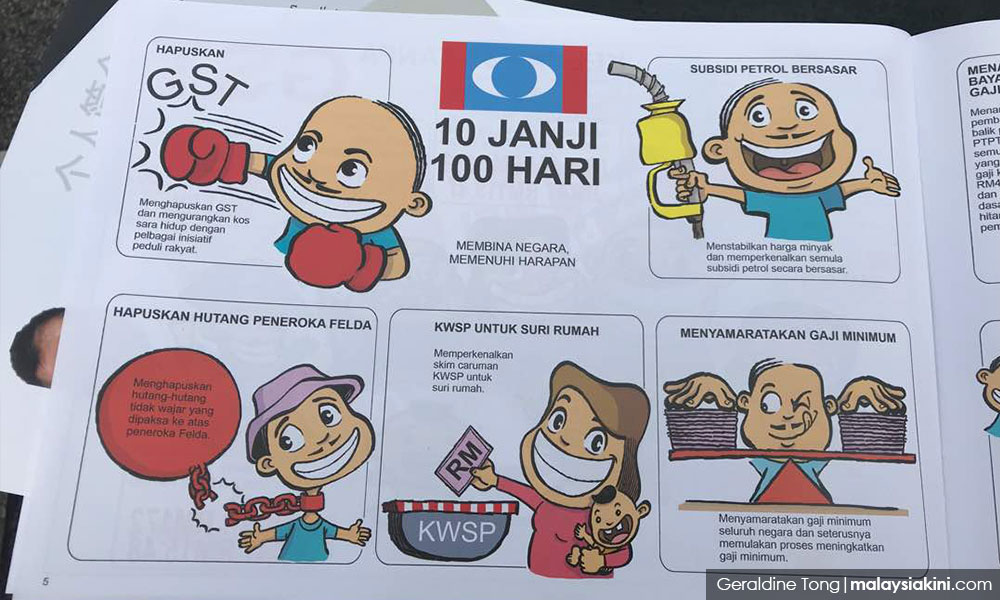
Last night marked a historic occasion for Malaysia as Dr Mahathir Mohamad took his oath as the seventh prime minister before the Yang di-Pertuan Agong Sultan Muhammad V, ending Umno and BN rule for the past 61 years.
Mahathir is not only the oldest prime minister in the world to take office, but could well be among the selected few to assume the position twice in non-consecutive terms, a distinction shared by Britain's Winston Churchill.
Malaysiakini revisits Pakatan Harapan's election promises in a bid to remind voters and the people about what to expect over the next few months and five years, as Malaysia navigates unchartered waters with a former opposition coalition in power for the first time.
Mahathir's track record as a serious "taskmaster" will be put to the test, as the country waits to see if Harapan can deliver on its manifesto promises.
Among the top proposals which Pakatan Harapan may embark on include:
- Removing several people who held senior positions in the government under the administration of ousted prime minister Najib Abdul Razak. This move may not be in the Harapan manifesto or a promise made to the people, but it is expected to be taken by Mahathir as Malaysiakini has learnt that some seven senior civil servants could be booted.
Mahathir indicated this in his first press conference last night where he warned that changes are planned with regards to certain heads of government agencies and authorities. - "Certain heads must fall. We find that some people were aiding and abetting a prime minister who the world condemned as a kleptocrat," stressed Mahathir.
- The abolition of the Goods and Services Tax (GST) which had received a lot of flak after Najib's government controversially implemented it on April 1, 2015.
Mahathir had in a press conference yesterday reaffirmed that the GST would be cancelled and replaced with the sales services tax. - Introducing targeted fuel subsidies to those who are qualified, especially those who have cars below 1300 cc and below and motorcycles below 125cc.
- Forming a Royal Commission of Inquiry or launching further investigations into 1MDB, Felda, Mara and Tabung Haji or other government agencies. In Najib’s last term as prime minister, his administration was plagued by many scandals, the largest of which was 1MDB, which has been and is still currently being investigated in several foreign jurisdictions including the United States.
This would be followed by reforming these institutions to strengthen their corporate governance. - Standardising and possibly increasing the minimum wage to RM1,500 per month to help the lower income group. This would be in line with the initiative to prioritise employing local workers, in order to reduce the reliance on two million foreign workers.
- Postponing the repayment of the National Higher Education Fund (PTPTN) loans until graduates arrive at a monthly wage of RM4,000. This will benefit young graduates, some of whom are reportedly facing difficulties in finding jobs as well as bankruptcy proceedings and being banned from travelling abroad as a result of defaulting on their student loans.
Besides this, there are plans to provide free education to those studying in public institutions of higher learning. - Creating one million new jobs, which is expected to benefit youth and unemployed graduates who are facing problems finding jobs. It was reported last month that the unemployment rate in February was 3.3 percent.
- Mahathir's government is also expected to form a task force to give autonomy to the states in East Malaysia namely Sabah and Sarawak, in line with the Malaysia Agreement 1963.
- Abolishing toll charges in stages.
- Limiting the terms of office for prime minister, menteri besar and chief ministers to two terms.
- Introducing health subsidies, namely an RM500 medical allowance for the B40 or lower income group.
- Separating the functions of the attorney-general and public prosecutor to prevent conflicts of interests.
- Abolishing draconian laws like the Sedition Act, University and University Colleges Act, Prevention of Crime Act, Printing Presses and Publications Act, National Security Council Act.
- Removing the provisions which are seen as discriminatory in the Security Offences (Special Measures) Act, and removing provisions or ouster clauses that exempt government decisions from judicial review.
A full list of the promises contained within the Harapan manifesto which was tabled on March 8 is listed here. -Mkini



No comments:
Post a Comment
Note: Only a member of this blog may post a comment.